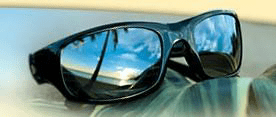June 11, 2013
What most affects the health of my eyes?
The three most critical factors for keeping your eyes as healthy as possible are sunlight protection, nutrition, and smoking avoidance. The eye doctors at Vision Center P.C. in Muscatine, Tipton, and Wapello want to help Eastern Iowan’s eyes healthy for years to come!
Sunlight
You’re probably well aware of the need to protect your skin from the sun, but it’s equallyimportant to protect your eyes.
Ultraviolet (UV) radiation consists of invisible rays from the sun. The three bands of UV light are: UVA, UVB and UVC. UVB rays are of the most concern to eye health.
- UVB rays burn the skin and can damage the eyes. Combined with cold wind and snow, UVB has the potential to cause snow blindness (photokeratitis), a temporary (lasting 12 to 48 hours) but painful problem in the cornea of the eye.
- Although not all scientists agree, there is some research that suggests that daily exposure to UVB and blue light in very bright sunlight over a period of many years may cause cataracts, a gradual clouding of the lens of the eye, and promote damage in the form of macular degeneration.
- Experts also suspect that the primary cause of eye growths such as pingueculae or pterygia is exposure to UVB rays.

Sunglasses can be polarized and reflection-free, allowing good light in and keeping bad light out.
Nutrition
Intensive research is currently being conducted to determine the role of diet and nutrition in the prevention and treatment of various eye diseases. Studies have suggested that several nutrients are associated with maintaining eye health such as the antioxidants lutein, zeaxanthin, beta-carotene, vitamin C, vitamin E, and zinc.
The research suggests that antioxidants reduce your risk of cataracts and macular degeneration by ridding the body of toxins associated with disease. Specific antioxidants can have additional benefits as well; for example, vitamin A protects against blindness, and vitamin C may play a role in preventing or alleviating glaucoma.
Essential fatty acids appear to help the eye in a variety of ways, from alleviating symptoms of dry eye syndrome to guarding against macular damage.
Smoking
People who smoke cigarettes are at increased risk for developing cataracts, a clouding of the naturally clear lens of the eye. Cataracts cause a variety of vision problems, including blurry distance vision, sensitivity to glare, loss of contrast and difficulty seeing colors. When glasses or magnifiers are no longer helpful for someone with cataracts, or when cataracts develop in both eyes, surgery is the only option.
Tobacco smoking is also one of the preventable risk factors for age-related macular degeneration (AMD). Studies have shown that current smokers and ex-smokers are more likely to develop AMD than people who have never smoked. AMD has two forms: dry (called atrophic) AMD and wet (called exudative) AMD. In dry AMD, your retina gradually thins. There is no proven cure for this type of degenerative disease. In wet AMD, new blood vessels grow in the retina, leaking blood or fluid, damaging the macula, the part of the retina responsible for your central vision. The two types of treatment currently available for specific forms of wet AMD are standard laser surgery and photodynamic therapy, both of which may stabilize the disease.
In people with high blood-sugar levels, some studies suggest that smoking may be linked to diabetic retinopathy, or damage to the blood vessels in the retina. The optic nerve is also susceptible to damage from smoking. People with poor diets who smoke heavily and drink excessive amounts of alcohol run the risk of developing optic nerverelated vision loss (called tobacco-alcohol amblyopia). Certain optic nerve problems run in families (called Leber’s hereditary optic neuropathy). People with this condition who smoke have increased risk of vision loss. In some patients with thyroid disease (called Graves’ disease) who also have eye involvement, smoking can cause the eyes to
become worse, with vision loss possible.
